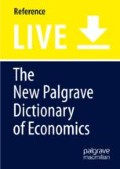Abstract
The theory of fair division is concerned with the design of procedures for allocating a bundle of goods among n persons who are perceived to have equal rights to the goods. Both equity (according to criteria discussed below) and efficiency are sought. The theory is of interest primarily because its approach to allocation problems enjoys some important advantages over the alternative approach suggested by neoclassical welfare economics, and because studying the sense in which procedures actually in use are equitable is a good way to learn about popular notions of equity.
This chapter was originally published in The New Palgrave: A Dictionary of Economics, 1st edition, 1987. Edited by John Eatwell, Murray Milgate and Peter Newman
Bibliography
Crawford, V. 1977. A game of fair division. Review of Economic Studies 44(2): 235–247.
Crawford, V. 1979. A procedure for generating Pareto-efficient egalitarian-equivalent allocations. Econometrica 47(1): 49–60.
Crawford, V. 1980. A self-administered solution of the bargaining problem. Review of Economic Studies 47(2): 385–392.
Crawford, V., and W. Heller. 1979. Fair division with indivisible commodities. Journal of Economic Theory 21(1): 10–27.
Dubins, L., and E. Spanier. 1961. How to cut a cake fairly. American Mathematical Monthly 68(1): 1–17.
Foley, D. 1967. Resource allocation and the public sector. Yale Economic Essays 7(1): 45–98.
Kolm, S. 1972. Justice et équité. Paris: Editions du Centre National de la Recherche Scientifique.
Kuhn, H. 1967. Chapter 2. On games of fair division. In Essays in honor of Oskar Morgenstern, ed. M. Shubik. Princeton: Princeton University Press.
Luce, R., and H. Raiffa. 1957. Games and decisions: Introduction and critical survey. New York: Wiley.
Pazner, E., and D. Schmeidler. 1978. Egalitarian equivalent allocations: A new concept of economic equity. Quarterly Journal of Economics 92(4): 671–687.
Steinhaus, H. 1948. The problem of fair division. Econometrica 16(1): 101–104.
Steinhaus, H. 1950. Mathematical snapshots. New York: Oxford University Press.
Author information
Authors and Affiliations
Editor information
Editors and Affiliations
Copyright information
© 1987 The Author(s)
About this entry
Cite this entry
Crawford, V.P. (1987). Fair Division. In: The New Palgrave Dictionary of Economics. Palgrave Macmillan, London. https://doi.org/10.1057/978-1-349-95121-5_252-1
Download citation
DOI: https://doi.org/10.1057/978-1-349-95121-5_252-1
Received:
Accepted:
Published:
Publisher Name: Palgrave Macmillan, London
Online ISBN: 978-1-349-95121-5
eBook Packages: Springer Reference Economics and FinanceReference Module Humanities and Social SciencesReference Module Business, Economics and Social Sciences

